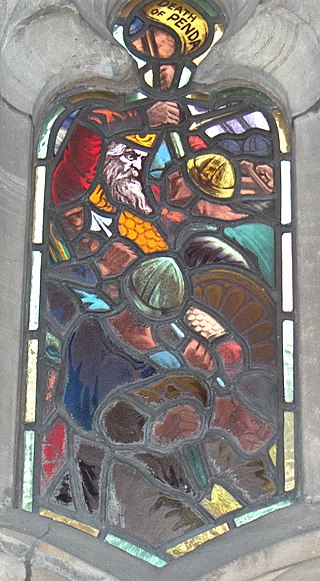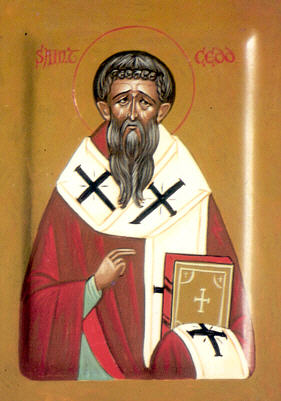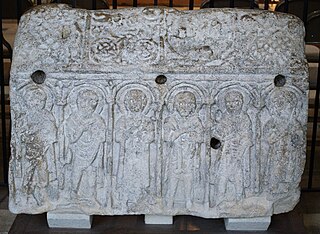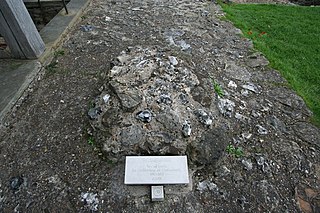The 650s decade ran from January 1, 650, to December 31, 659.

Mercia was one of the three main Anglic kingdoms founded after Sub-Roman Britain was settled by Anglo-Saxons in an era called the Heptarchy. It was centred on the River Trent and its tributaries, in a region now known as the Midlands of England.
Oswiu, also known as Oswy or Oswig, was King of Bernicia from 642 and of Northumbria from 654 until his death. He is notable for his role at the Synod of Whitby in 664, which ultimately brought the church in Northumbria into conformity with the wider Catholic Church.

Æthelred was king of Mercia from 675 until 704. He was the son of Penda of Mercia and came to the throne in 675, when his brother, Wulfhere of Mercia, died from an illness. Within a year of his accession he invaded Kent, where his armies destroyed the city of Rochester. In 679 he defeated his brother-in-law, Ecgfrith of Northumbria, at the Battle of the Trent: the battle was a major setback for the Northumbrians, and effectively ended their military involvement in English affairs south of the Humber. It also permanently returned the kingdom of Lindsey to Mercia's possession. However, Æthelred was unable to re-establish his predecessors' domination of southern Britain.

Wulfhere or Wulfar was King of Mercia from 658 until 675 AD. He was the first Christian king of all of Mercia, though it is not known when or how he converted from Anglo-Saxon paganism. His accession marked the end of Oswiu of Northumbria's overlordship of southern England, and Wulfhere extended his influence over much of that region. His campaigns against the West Saxons led to Mercian control of much of the Thames valley. He conquered the Isle of Wight and the Meon valley and gave them to King Æthelwealh of the South Saxons. He also had influence in Surrey, Essex, and Kent. He married Eormenhild, the daughter of King Eorcenberht of Kent.

Penda was a 7th-century king of Mercia, the Anglo-Saxon kingdom in what is today the Midlands. A pagan at a time when Christianity was taking hold in many of the Anglo-Saxon kingdoms, Penda took over the Severn Valley in 628 following the Battle of Cirencester before participating in the defeat of the powerful Northumbrian king Edwin at the Battle of Hatfield Chase in 633.

The Battle of the Winwaed was fought on 15 November 655 between King Penda of Mercia and Oswiu of Bernicia, ending in the Mercians' defeat and Penda's death. According to Bede, the battle marked the effective demise of Anglo-Saxon paganism.
Æthelhere was King of East Anglia from 653 or 654 until his death. He was a member of the ruling Wuffingas dynasty and one of three sons of Eni to rule East Anglia as Christian kings. He was a nephew of Rædwald, who was the first of the Wuffingas of which more than a name is known.

Anna was king of East Anglia from the early 640s until his death. He was a member of the Wuffingas family, the ruling dynasty of the East Angles, and one of the three sons of Eni who ruled the kingdom of East Anglia, succeeding some time after Ecgric was killed in battle by Penda of Mercia. Anna was praised by Bede for his devotion to Christianity and was renowned for the saintliness of his family: his son Jurmin and all his daughters – Seaxburh, Æthelthryth, Æthelburh and possibly a fourth, Wihtburh – were canonised.
Osthryth, queen of the Mercians, was the wife of King Æthelred and daughter of King Oswiu of Northumbria and his second wife Eanflæd. She probably married Æthelred before 679 and was murdered by the nobles of Mercia.
Sigeberht II, nicknamed the Good (Bonus) or the Blessed (Sanctus), was King of the East Saxons, in succession to his relative Sigeberht I the Little. Although a bishopric in Essex had been created under Mellitus, the kingdom had lapsed to paganism and it was in Sigeberht's reign that a systematic (re-)conversion of the East Anglians took root. Bede's Historia Ecclesiastica, Book III, chapter 22, is virtually the sole source for his career.

Cedd was an Anglo-Saxon monk and bishop from the Kingdom of Northumbria. He was an evangelist of the Middle Angles and East Saxons in England and a significant participant in the Synod of Whitby, a meeting which resolved important differences within the Church in England. He is venerated in the Catholic Church, Anglicanism, and the Orthodox Church.
Alhfrith or Ealhfrith was King of Deira under his father Oswiu, King of Bernicia, from 655 until sometime after 664. Appointed by Oswiu as a subordinate ruler, Alhfrith apparently clashed with his father over religious policy, which came to a head at the Synod of Whitby in 664. After this, Alhfrith disappears from the historical record.

Medeshamstede was the name of Peterborough in the Anglo-Saxon period. It was the site of a monastery founded around the middle of the 7th century, which was an important feature in the kingdom of Mercia from the outset. Little is known of its founder and first abbot, Sexwulf, though he was himself an important figure, and later became bishop of Mercia. Medeshamstede soon acquired a string of daughter churches, and was a centre for an Anglo-Saxon sculptural style.
Æthelwold, also known as Æthelwald or Æþelwald, was a 7th-century king of East Anglia, the long-lived Anglo-Saxon kingdom which today includes the English counties of Norfolk and Suffolk. He was a member of the Wuffingas dynasty, which ruled East Anglia from their regio at Rendlesham. The two Anglo-Saxon cemeteries at Sutton Hoo, the monastery at Iken, the East Anglian see at Dommoc and the emerging port of Ipswich were all in the vicinity of Rendlesham.

The Middle Angles were an important ethnic or cultural group within the larger kingdom of Mercia in England in the Anglo-Saxon period.
Diuma was the first Bishop of Mercia in the Anglo-Saxon Kingdom of Mercia, during the Early Middle Ages.

Events from the 7th century in England.

Throughout its history the Kingdom of Mercia was a battleground between conflicting religious ideologies.

Ealhflæd was a seventh-century Mercian queen and the wife and murderer of Peada of Mercia.












